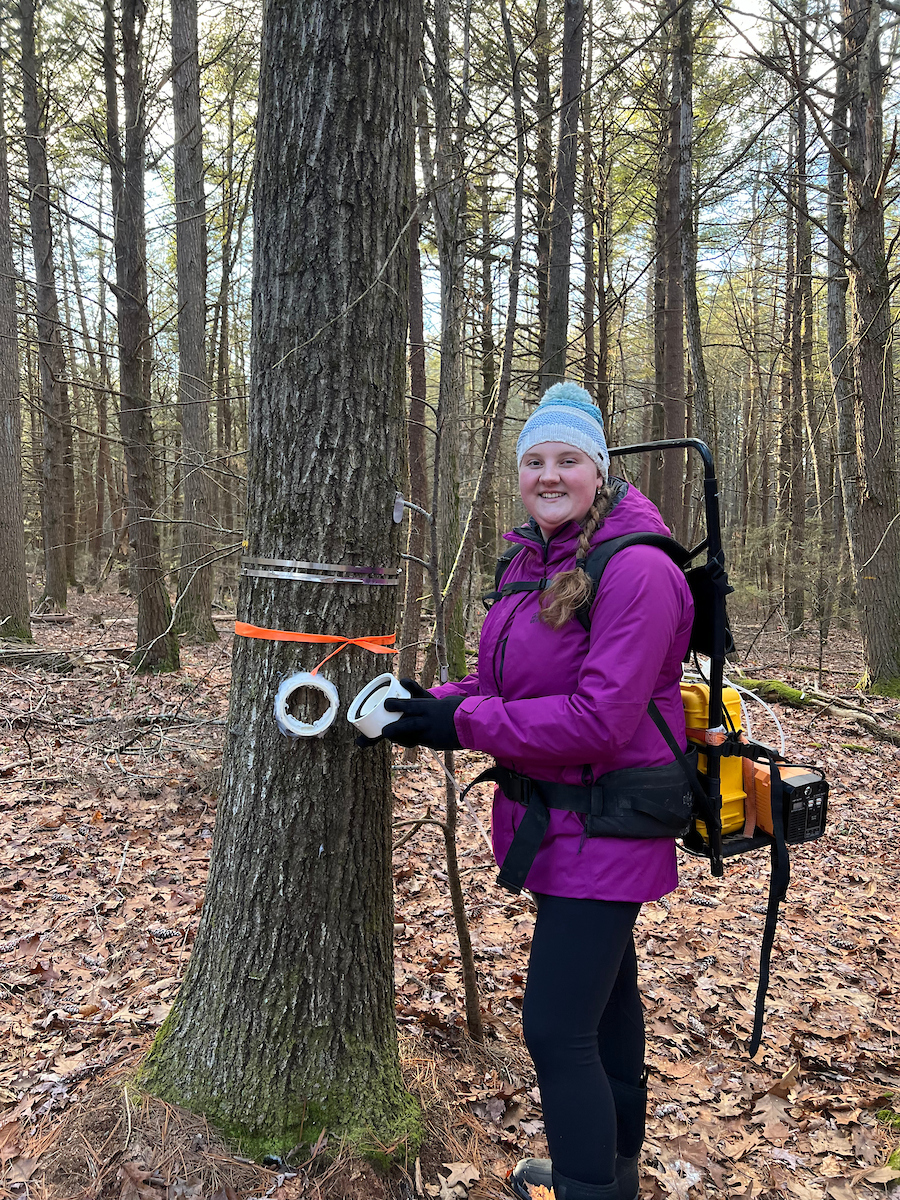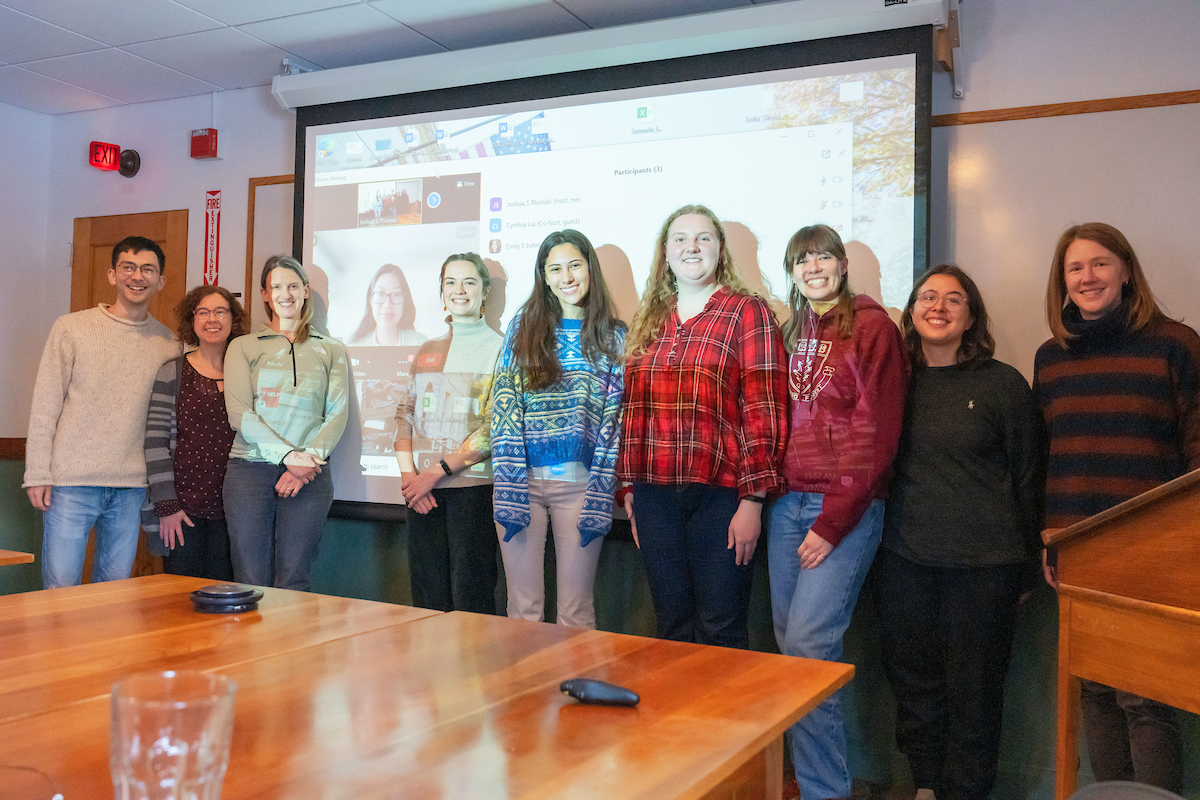You are here
Winter Interns Gain Skills, Advance Harvard Forest Research Efforts
This January, Harvard Forest hosted five winter interns to advance research questions in collaboration with Harvard Forest researchers studying a variety of topics. Despite the brief nature of this program -- only 2.5 weeks -- the Harvard University student interns produced a significant body of work that will continue informing the efforts of future interns and scientists alike.
Cold but Not Asleep: Winter Field Science to Understand Mechanisms of Forest Methane Cycling
Hannah Burrows & Annabelle Rayson, Harvard College
Methane is an important greenhouse gas causing climate change. Measuring the background natural methane cycling in forests is critical for being able to understand the efficacy of global methane reduction efforts (e.g. reducing fossil fuel leakage). In forests, it has been a big puzzle about if/when/how methane might be produced by and/or transported through forest trees and ultimately into the atmosphere. Periodic measurements during the summer at Harvard Forest have shown that tree stems are sometimes sources of methane to the atmosphere, especially for wetland-adapted species when soils are flooded. However, the mechanisms of this methane release are not well understood, where methane could be produced by microbes within the tree stem microbiome or transported from water up the tree stem with xylem water flow.
 During their internship, Hannah and Annabelle collected the first wintertime measurements of tree stem methane and carbon dioxide exchange in field conditions at Harvard Forest (Annabelle is pictured to the right). By collecting soil and stem flux of methane during conditions when deciduous trees are largely dormant -- and providing analysis of their preliminary results -- Annabelle and Hannah have collected critical data that will help to inform and potentially revise researchers' future understanding of methane dynamics in temperate forests.
During their internship, Hannah and Annabelle collected the first wintertime measurements of tree stem methane and carbon dioxide exchange in field conditions at Harvard Forest (Annabelle is pictured to the right). By collecting soil and stem flux of methane during conditions when deciduous trees are largely dormant -- and providing analysis of their preliminary results -- Annabelle and Hannah have collected critical data that will help to inform and potentially revise researchers' future understanding of methane dynamics in temperate forests.
Mentored by Dr. Jackie Matthes, Harvard Forest Senior Ecologist (Harvard College '07); Naomi Hegwood, Harvard Forest Research Assistant (Harvard College '23); and Jon Gewirtzman, PhD candidate at the Yale School of Environment
The Hemlock Removal Experiment: Do Deer and Moose Alter the Future of the Eastern Hemlock Forest?
Katherinne Fox, Harvard College
Herbivory by deer and moose can dramatically alter forest plant community composition, especially in forests that are regenerating after canopy mortality. Throughout the northeastern US, eastern hemlock (Tsuga canadensis) forests are declining from an invasive insect, the hemlock woolly adelgid – but in addition to these tiny insects, large mammals may also shape the future forest. Deer and moose love to browse the tree saplings that grow after hemlock trees die and the forest transforms from a shady, mature forest to a dense thicket of young trees and sun-loving understory plants. Harvard Forest eastablished the Hemlock Removal Experiment in 2003, and early on during the experiment, researchers observed deer and moose browsing. Therefore, in 2011 a fence was installed to enclose half of each plot and exclude moose and deer.
During her internship, Katherinne analyzed 10 years of data to investigate whether the structure and composition of tree saplings and/or understory plants is altered when deer and moose browsing is excluded. While density of saplings and seedlings did not differ between fernced & unfenced plots, some interesting trends emerged regarding species that were tolerant of or resistant to herbivory.
Mentored by Audrey Barker Plotkin, Harvard Forest Senior Ecologist, and Dr. Ed Faison, Senior Ecologist at Highstead
Exploring STEM Identity in a K-12 Community Science Program
Cynthia Liu, Harvard Graduate School of Education
The Harvard Forest Schoolyard Ecology Program is community science project that across almost two decades has engaged over 40,000 students in authentic STEM data collection in their local schoolyards in the Northeast US. The Schoolyard Team is conducting a large study of STEM identity of student participants, examining how students' STEM identity might shift during participation during in the program.
During this internship, which spans the winter and spring semesters, Cynthia has begun reviewing literature and comparable research frameworks to inform a post-program survey comprised of both quantitative and qualitative questions for participants.
Mentored by Katharine Hinkle, Harvard Forest Schoolyard Ecology Program Coordinator; Clarisse Hart, Harvard Forest Director of Education & Outreach; and Dr. Tara Goodhue, Science Teacher at Lowell High School
Long-term impacts of summer research experiences at Harvard Forest: What can we learn about the Harvard Forest REU experience?
Grace Burgin, Harvard Graduate School of Arts and Sciences
Undergraduate research experiences in STEM fields provide many students with their first hands-on experience in research. However, a recent review (Linn et al. 2015, Science 347:627) suggested that available program data are insufficient to determine whether students’ future “success” in science is improved by their participation in undergraduate research experiences.
The Harvard Forest Summer Research Program in Ecology (HF-SRPE) annually supports 20-30 undergraduates from diverse backgrounds, each of whom participates in 11 weeks of team-based, mentor-supervised research on forest ecosystems. Students also participate in seminars, educational workshops, and career/graduate school panels. The current longitudinal survey began in 2016 and tracks individuals before, during, and after their participation in the HF-SRPE. This study builds on prior work; since 2006 Harvard Forest has administered pre- and post-program student evaluation surveys to assess (1) acquisition and enhancement of scientific research skills; (2) satisfaction with the REU learning experience; and (3) post-program plans for STEM education and career development. An annual survey also assesses long-term STEM education and career trajectories of HF-SRPE alumni.
During her internship, Grace Burgin designed an approach based on the available survey data to evaluate the short- and long-term impacts of participating in the HF-SRPE. After identifying that Research Experience for Undergraduate (REU) participants (e.g., HF-SRPE students) have a higher likelihood of pursuing graduate studies and persisting in STEM fields when compared to non-REU counterparts, Grace sought to understand why. By examining data from student evaluation surveys, she determined that student teams that arrive with heterogenous prior research experience (i.e., a different level of experience between teammates) may improve the overall REU experience. This finding will help program coordinators identify actions to take that will improve the REU research experiences overall.
Mentored by Ben Goulet-Scott, Higher Education & Laboratory Coordinator at Harvard Forest (Harvard OEB PhD '22); Audrey Barker Plotkin, Harvard Forest Senior Ecologist

Above, from left to right, are key individuals involved in the program: Ben Goulet-Scott, Audrey Barker Plotkin, Katharine Hinkle, Cynthia Liu (online), Grace Burgin, Katherinne Fox, Anabelle Rayson, Hannah Burrows, Naomi Hegwood, and Jackie Matthes. This year's winter internship program was coordinate by Ben Goulet-Scott, Higher Education & Laboratory Coordinator.

